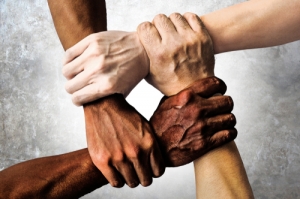Displaying items by tag: Change
Why being non-racist is no longer enough
Just like most of us, I’m part of a number of WhatsApp and Facebook groups. Some are work related, some I joined because of common interests. When one country after the other went into lockdown, the topic most discussed was obviously Covid-19. The amount of support people were offering each other was heart-warming, be it getting groceries for the more vulnerable amongst us, stitching scrubs and clapping for NHS workers, or simply offering a comforting word. It was, in short, communities coming together in a crisis and making the best of it.
Together.
Then came US Memorial Day, and a horrendous video of a police officer killing an African American man went viral.
The riots and demonstrations started the very next day.
What began as a local outcry for justice became a national topic and is now a global movement. Influenced by a long history of civil rights campaigns, #BlackLivesMatter, or BLM, as the media often refers to it, first appeared in the USA in 2013, and has now gained momentum across Europe and other continents.
And it’s here to stay.
My various groups started to discuss racism and discrimination in general. It’s a topic that had often been tiptoed around as it was too ‘sensitive’ to really ‘go into’. And the voices were loud and plenty. As if a floodgate had been opened, people were sharing their stories. Some were subtle like being stared at on public transport or in shops, while others were outright scary. From being ‘randomly selected’ for a body search at the airport to being called names I don’t want to repeat or being physically assaulted. Story after story appeared and the knot in my stomach grew.
It’s not that I didn’t know that these things were happening, but I am embarrassed to admit that I was making myself blind to it. Not consciously, but more like a bird up in the trees, enjoying the beautiful view, the sunlight and the freedom – breathing – without really looking down into the undergrowth.
It was during one of these discussions – and by now I was actively participating – when I got a private message from a friend announcing that he no longer wanted to be part of the group. After inquiring why, he simply said that “there wasn’t room for others to think differently”.
I’d like you to sit with this sentence for a bit.
“There wasn’t room for others to think differently”.
All those voices, stories and hardship were reduced to “one-way thinking”. I was absolutely stunned and truly lost for words. He ended his message by asking for “my forgiveness”. What was I supposed to forgive? His ignorance? His lack of understanding or empathy? His contradictory statement? I still don’t know.
From there onwards, more people started to drop out from various groups because they were just “not doing it” for them anymore. And I started to wonder.
I grew up in a beautiful and picturesque part of Germany, and it was very easy to be non-racist. Simply because there were no other people from different races. The closest I would get to a person of colour was Michael Jackson in a concert. It took meeting my future husband for me to realise in what kind of bubble I had been living.
He is a wonderful man and we have two gorgeous children together and yet I have had to justify my choice of spouse many times over the years simply because of his skin colour. Why? Why is his darker tone the determining factor as supposed to him being an honest, loving and funny person? At first, I tried to explain, to justify but then I got exhausted of explaining and kept quiet.
Although silence can be really powerful, as Marina Abramovic demonstrated with her performing arts piece in which two people sit across from one another without a single word spoken. Here, silence becomes a new mode of communication, a context for observation and, crucially, self-reflection. The latter being the key. One needs quiet to self-reflect. But it can become an excuse.
By being silent you decide to give voice to those who speak. By not voting you support the current government. By inaction you choose the status quo.
Silence is consent.
The pendulum has been pulled too far to one side and in order for it to even out, it needs a push to the other. Let’s do it together.
Don’t be silent. Being non-racist isn’t enough anymore.
We have to be anti-racist.


